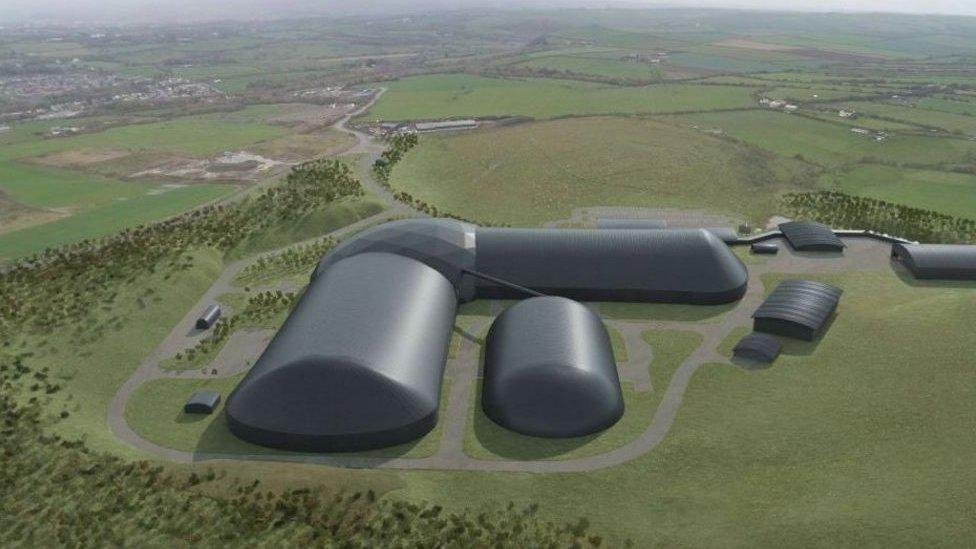Cumbria coal mine: Public inquiry after government U-turn
- Published
- comments

Artist's impression of how the new mine will look
A public inquiry has been announced into plans for the first new deep coal mine in the UK for decades.
The government had previously decided not to intervene in the project near Whitehaven in Cumbria, which was in the hands of local officials.
But ministers have taken control because of "increased" controversy.
Green campaigners say the mine will increase carbon emissions and send the wrong signal in the run-up to a UK-hosted climate conference in October.
The Woodhouse Colliery would extract coking coal for the steel industry from the seabed off St Bees, with a processing plant at Kells, in Whitehaven.
Cumbria County Council councillors, who have been assessing the project since 2017, gave it the go-ahead last March - but have since decided to review the application.
Last month it was reported that the government's climate tsar, Alok Sharma, was apoplectic the plans for the coal mine had not been stopped.
Mr Sharma, who is in charge of preparations for the COP26 UN climate conference, has faced calls to resign over the issue.
He told MPs only last month that the mine was a "local issue" and would be decided by the council.
But the government has now decided to "call in" the application, meaning Communities Secretary Robert Jenrick will get the final say over it.
'Cloud cuckoo land'
In a letter to Cumbria County Council, Mr Jenrick said the application had raised issues of "more than local importance".
He added the reversal had also been prompted by new advice on carbon emissions from government climate advisers published in December, external.
However, a public inquiry will first be held by independent planners at the Planning Inspectorate. The inquiry process could take a number of months.
Asked on Friday whether the government backed the mine or not, Boris Johnson said he couldn't get involved as it was now a "qausi-judicial planning decision".
MP Trudy Harrison, whose Copeland constituency would include the mine, is a ministerial aide to the prime minister and has described opponents of the mine as being in "cloud cuckoo land"., external
Ms Harrison has yet to comment on the decision to hold an inquiry, but the Tory MP for nearby Workington, Mark Jenkinson, called the decision a "capitulation to climate alarmists".
Speaking to BBC Radio Cumbria, he said the "screeching U-turn" could open a "Pandora's box" over how the UK's contribution to climate change is measured.
He added there was "nothing on the horizon" to replace coking coal in the process for making steel, a sector that is due to play an important role in the UK's "green recovery".


The government could still decide to approve the mine, but given the amount of anger it's caused that seems unlikely - at least until after the UN climate conference.
Local Conservatives strongly supported the scheme and the employment it would bring.
But the government's climate advisers, along with a crowd of green groups, warned it would increase carbon emissions when the UK's committed to cutting them.
What's more, it would harm Britain's international reputation before the UN conference, they said.
One of the world's leading climate scientists, the American James Hansen, warned Boris Johnson risked humiliation over the mine.
The US climate envoy John Kerry warned against it on Monday. And yesterday Alok Sharma was again rebuked by MPs over the plan.
It was too much pressure.

Prof Rebecca Willis and Prof Mike Berners-Lee from Lancaster University say the mine would produce 8.4m tonnes of CO2 per year, equivalent to the emissions from more than a million households.
Supporters of the mine say that by producing coal to be used in Europe, the mine will reduce emissions from shipping coal from Australia or the USA.
But the mine proposal comes at a time when the government wants every sector of the UK economy to reduce CO2 emissions - not find new sources of carbon.
Labour's shadow environment secretary Ed Miliband said the government should "block" the mine and "provide alternative jobs in the green industries of the future".
"We owe people a long-term secure employment situation, the mine isn't the answer," he told reporters.
He added that whilst there was a "current need" for coking coal in steelmaking, "all experts say over time the industry's going to need to move towards hydrogen as the answer".
Lib Dem Tim Farron, MP for nearby Westmoreland and Lonsdale, said: "In the year that Britain hosts COP26, it is blindingly obviously that we won't be taken seriously on the world stage with this coal mine hanging round our neck."
He added: "I hope this public inquiry leads to these plans finally being axed, and the government instead looks at bringing well-paid, long-term, green jobs to Cumbria."